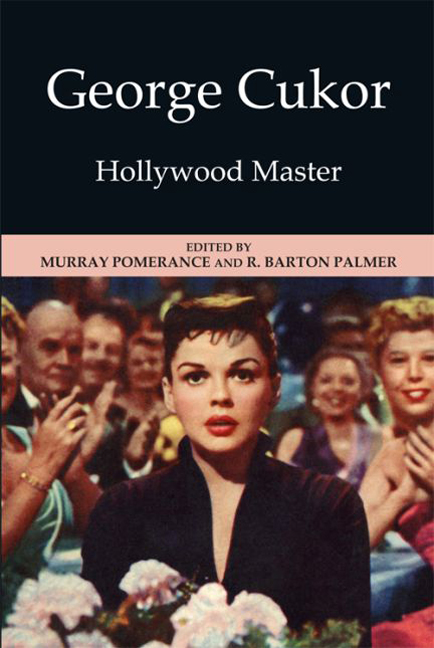Book contents
- Frontmatter
- Contents
- List of Figures
- List of Contributors
- Acknowledgments
- Introduction
- 1 Cukor's Tragicomedies of Marriage: Dinner at Eight, No More Ladies, The Women, and The Marrying Kind
- 2 George Cukor's Late Style: Justine, Travels With My Aunt, and Rich and Famous
- 3 Libel, Scandal, and Bad Big Names: It Should Happen to You, Les Girls, Camille, and Romeo and Juliet
- 4 The Cukor “Problem”: David Copperfield, Holiday, and The Philadelphia Story
- 5 Modulations of the Shot: The Quiet Film Style of George Cukor in What Price Hollywood?, Born Yesterday, Sylvia Scarlett, and My Fair Lady
- 6 Doubling in the Cinema of George Cukor: The Royal Family of Broadway, A Bill of Divorcement, A Double Life, and Bhowani Junction
- 7 George Cukor and the Case of an Actor's Director: Hepburn and/or Tracy in Little Women, The Actress, Keeper of the Flame, Adam's Rib, and Pat and Mike
- 8 Cukor Maudit: Tarnished Lady, Girls About Town, Our Betters, Susan and God, Desire Me, Edward, My Son, The Model and the Marriage Broker, Let's Make Love, and The Chapman Report
- 9 George Cukor's Theatrical Feminism: Gaslight, Heller in Pink Tights, A Life of Her Own, and A Star is Born
- 10 The Furthest Side of Paradise: Two-Faced Woman, A Woman's Face, Hot Spell, Wild is the Wind, and Winged Victory
- Works Cited and Consulted
- Index
2 - George Cukor's Late Style: Justine, Travels With My Aunt, and Rich and Famous
Published online by Cambridge University Press: 07 October 2017
- Frontmatter
- Contents
- List of Figures
- List of Contributors
- Acknowledgments
- Introduction
- 1 Cukor's Tragicomedies of Marriage: Dinner at Eight, No More Ladies, The Women, and The Marrying Kind
- 2 George Cukor's Late Style: Justine, Travels With My Aunt, and Rich and Famous
- 3 Libel, Scandal, and Bad Big Names: It Should Happen to You, Les Girls, Camille, and Romeo and Juliet
- 4 The Cukor “Problem”: David Copperfield, Holiday, and The Philadelphia Story
- 5 Modulations of the Shot: The Quiet Film Style of George Cukor in What Price Hollywood?, Born Yesterday, Sylvia Scarlett, and My Fair Lady
- 6 Doubling in the Cinema of George Cukor: The Royal Family of Broadway, A Bill of Divorcement, A Double Life, and Bhowani Junction
- 7 George Cukor and the Case of an Actor's Director: Hepburn and/or Tracy in Little Women, The Actress, Keeper of the Flame, Adam's Rib, and Pat and Mike
- 8 Cukor Maudit: Tarnished Lady, Girls About Town, Our Betters, Susan and God, Desire Me, Edward, My Son, The Model and the Marriage Broker, Let's Make Love, and The Chapman Report
- 9 George Cukor's Theatrical Feminism: Gaslight, Heller in Pink Tights, A Life of Her Own, and A Star is Born
- 10 The Furthest Side of Paradise: Two-Faced Woman, A Woman's Face, Hot Spell, Wild is the Wind, and Winged Victory
- Works Cited and Consulted
- Index
Summary
“Late style is in, but oddly apart from the present” (Said 24)—so writes Edward Said in On Late Style. Published in 2006 following Said's death in 2003, the book is an elegant treatment of the question of “lateness” in art and culture, its posthumous appearance making it a poignant example of its own subject. Although its wide-ranging anatomy of the theme demonstrates the mastery Said attributes to late style, it also remains fittingly incomplete, fittingly because the aspects of late style that Said emphasizes are its unsettled and unresolved qualities. Though Said acknowledges late works that reflect maturity, wisdom, and reconciliation—Sophocles's Oedipus at Colonus, Shakespeare's The Tempest or The Winter's Tale, Verdi's final operas—he reserves his keenest interest for works in which “consciousness of being at the end” (14) shadows such qualities. He is most engaged with a kind of “mastery” that challenges our usual ideas of that concept, partaking of senescence, resignation, a refusal or harmony of final serenity.
In this Said follows Theodor Adorno, whose work on Beethoven in particular influenced most serious discussion of late style in recent decades. For Adorno, as Said notes, lateness is “the idea of surviving beyond what is acceptable and normal” (13). Beethoven is the quintessential example because his final compo¬sitions turn so decisively away from the organic unity of his early work into something “wayward and eccentric” (10), even irascible and willfully resistant to prevailing tastes. Such resistance is the saving grace of late style, according to Adorno. For all its incongruities or discontinuities—because of them, in fact—late work stands apart from the habitual assumptions of its own time, whether because of a backward-looking commitment to now-outmoded practices or an evolution of techniques that derive from past work but take on altered meaning due to their differences from a new order that has arisen around them. Either way, the late work Adorno extols does not easily fit into reigning paradigms and cannot be readily co-opted by the zeitgeist.
The question of late style is especially fraught in art forms like cinema that are industry-based and typically governed by organized institutions that tightly regulate accepted norms, the Hollywood cinema remaining the paragon.
- Type
- Chapter
- Information
- George CukorHollywood Master, pp. 28 - 42Publisher: Edinburgh University PressPrint publication year: 2015



